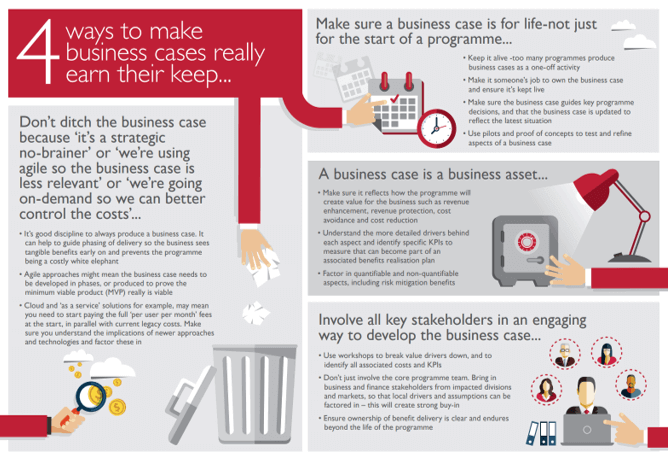What you should think about when writing your business case
1. Don’t ditch the business case because ‘it’s a strategic no-brainer’ or ‘we’re using agile so the business case is less relevant’ or ‘we’re going on-demand so we can better control the costs’...
- It’s good discipline to always produce a business case. It can help to guide phasing of delivery so the business sees tangible benefits early on and prevents the programme being a costly white elephant
- Agile approaches might mean the business case needs to be developed in phases, or produced to prove the minimum viable product (MVP) really is viable
- Cloud and ‘as a service’ solutions for example, may mean you need to start paying the full ‘per user per month’ fees at the start, in parallel with current legacy costs. Make sure you understand the implications of newer approaches and technologies and factor these in
2. Make sure a business case is for life - not just for the start of a programme...
- Keep it alive -too many programmes produce business cases as a one-off activity
- Make it someone’s job to own the business case and ensure it’s kept live
- Make sure the business case guides key programme decisions, and that the business case is updated to reflect the latest situation
- Use pilots and proof of concepts to test and refine aspects of a business case
3. A business case is a business asset...
- Make sure it reflects how the programme will create value for the business such as revenue enhancement, revenue protection, cost avoidance and cost reduction
- Understand the more detailed drivers behind each aspect and identify specific KPIs to measure that can become part of an associated benefits realisation plan
- Factor in quantifiable and non-quantifiable aspects, including risk mitigation benefits
4. Involve all key stakeholders in an engaging way to develop the business case...
- Use workshops to break value drivers down, and to identify all associated costs and KPIs
- Don’t just involve the core programme team. Bring in business and finance stakeholders from impacted divisions and markets, so that local drivers and assumptions can be factored in – this will create strong buy-in
- Ensure ownership of benefit delivery is clear and endures beyond the life of the programme.











